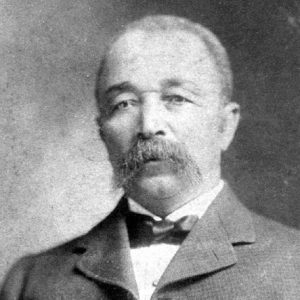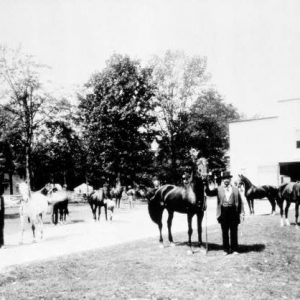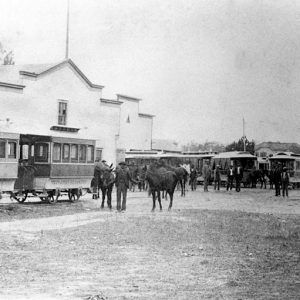calsfoundation@cals.org
Wiley Jones (1848–1904)
aka: Walter Jones
Walter “Wiley” Jones was one of the first wealthy African Americans in the South. Jones, a leading businessman, was an ex-slave who became a barber and a saloon owner.
Wiley Jones was born on July 14, 1848, in Madison County, Georgia. He was one of six children of George Jones, a white planter, and Ann, a slave. His mother named him Walter after her doctor, but he got the nickname “Wiley” for being untamed and playful.
In 1853, five-year-old Jones moved with his family to Arkansas. They settled on the former acting governor Richard Byrd’s plantation in Jefferson County, twelve miles north of Pine Bluff (Jefferson County) on the Arkansas River.
Shortly before George Jones’s death in 1858, he claimed to have manumission papers that would give Ann and her children freedom, but the papers were never found. The administrator of the estate sold the family to Peter Finerty. A short time later, they were sold to General James Yell, a prominent attorney and planter in Pine Bluff. On the Yell plantation, ten-year-old Jones drove the mules to the cotton gin. He was later given to Yell’s son, Fountain Pitts Yell, as a wedding present. Jones was a carriage driver for his master’s wife.
F. Pitts Yell enlisted in the Confederate army in 1861 and was promoted as a colonel. Jones became a camp servant for Colonel Yell. After the death of Colonel Yell, Jones joined the Yell family where they sought refuge in Waco, Texas. He went to work as caretaker of a mercantile store for a year. Later, he drove a cotton wagon on a route from Waco to San Antonio, Texas.
When the war ended in 1865, the Yell family and Jones returned to Arkansas, settling in Monticello (Drew County). He most likely had greater opportunities to improve his standing by associating with the family.
When Jones left the Yell family, he could not decide whether to go to Fort Smith (Sebastian County) or Pine Bluff. After a visit to Fort Smith, he decided that he wanted to be in Pine Bluff with his friends and family. In the latter part of 1865, Jones, at seventeen years of age, went to work as a mule driver for a while before going back to work for F. Pitts Yell on his plantation in Lincoln County. Jones was promoted to manager of the cotton plantation and made twenty dollars per month.
In 1868, Jones moved back to Pine Bluff after the crops were sold. He was hired to work at a local saloon for one year. In 1869, he learned to barber at the barbershop of his brother-in-law, Ben Reed. He worked there for ten years.
Jones earned room and board by working a second job at a nearby hotel as a waiter. He saved his pay from the barbershop and invested in real estate in the state of Arkansas. He also used his savings to loan money, with interest, to his friends. In 1876, Jones opened a successful saloon at 207 South Main. His brother James managed several businesses for him. One of Jones’s companies was the well-known Southern Mercantile Company. Although Jones had no schooling, he learned all about business from hard work and meeting people. As an unmarried man, he was able to work from sunrise to sunset, riding on his horse to check on his businesses.
Jones’s hobbies were horses and horse-racing, so he built a park on fifty-five acres near 17th and Main in Pine Bluff. It was a city recreational park with a harness-racing track. The park was also home to fairs, bicycle races, and annual May Day celebrations. Next to this park was the “Colored People’s Fair Grounds,” which housed amphitheaters and horse stables.
In August 1886, Jones became one of the first African Americans in the nation to receive a franchise to operate a mule-drawn streetcar system, which he established in Pine Bluff. It was named Wiley Jones Street Car Lines and merged with the Citizens Street Railway around December 1890. This later became the electric railway, which the city bought. Now known as the Pine Bluff Transit, it is still owned by the city of Pine Bluff.
On June 14, 1889, Jones made investments with Ed B. Houston of White Sulphur Springs, now known as Sulphur Springs (Jefferson County). They sold lots to Pine Bluff residents for summer homes.
Jones never ran for office, but he was one of Jefferson County’s most influential political citizens in the 1880s and 1890s. He was a delegate for several national Republican conventions. He served as a circuit clerk of Jefferson County from 1892 to 1894 and was involved in different civic affairs in the city. When the defeated Republican candidate for Congress John M. Clayton was assassinated in 1889, Jones was chosen as one of the citizen’s committee to escort his body from Little Rock (Pulaski County) to Pine Bluff.
Jones was one of several businessmen who supported the Colored Industrial Institute on 16th Avenue and State Street. He also donated land on Poplar and West Fourth Avenue for the black St. James Methodist Church.
Walter “Wiley” Jones died on December 7, 1904, from a heart attack and Bright’s disease in his home on 19th Avenue and Georgia Street. He was the richest Black person in the state at the time of his death, with an estate worth more than $300,000. He also owned twenty-four race horses and stallions. He was buried in a burglar-proof casket in his own cemetery west of Bellwood Cemetery, now known as Miller Cemetery, in Pine Bluff. It took several years to settle his estate because he did not leave a will.
For additional information:
Joslin, Rick. “A Day at the Races: The 19th Century Racetracks of Wiley Jones and Robert Ritchie Rice II.” Jefferson County Historical Quarterly 49 (Fall 2021): 25–31.
Leslie, Jim. “Wiley Jones, A Slave Who Left Mark on Pine Bluff’s Business World.” Pine Bluff Commercial. April 5, 1970, p. 13.
Brenda J. Hall
White Hall, Arkansas










Also looking for family; my great-great-grandmother was Irene Jones.
I’m family… Any family?